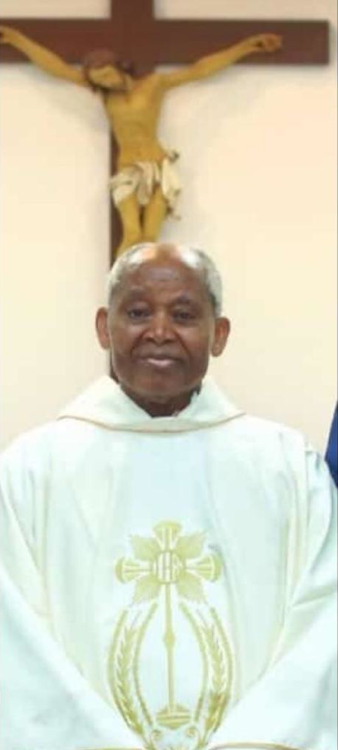The making of
Very Rev. Msgr. Sylvester Uwadineke Osigwe

William Shakespeare once said, “Be not afraid of greatness, some are born great, some achieve greatness, and some have greatness thrusted upon them.” This statement has proved to be true, especially looking at the historical background of great men and women who have distinguished themselves in different fields of human endeavor.
Very Rev. Msgr. Sylvester Emmanuel Uwadineke Osigwe fits comfortably into the description of men who are born great, considering how he has positively applied the healing gifts bestowed upon him by God to touch the life of the sick, the poor, and the oppressed of the society. When compared with most of his contemporaries who have monetized the gift of God, one will appreciate why a special mention is always made of his name because of holding tenaciously to the scriptural injunction to “give as freely as you have received” (Matthew 10:8). He has proved to be a truly compassionate healer and inspiration to younger generations of charismatic priests who willingly deploy their gifts to serve all people.
Born on July 19, 1939, at Ehime Mbano, Imo State, to the family of Mr. Anthony Osueke and Christiana Iheomakolam Osigwe, Msgr. Osigwe was the third child among eight children (four boys and four girls). At baptism, the name Emmanuel was considered, but his parents preferred Sylvester. He was also given the native name Uwadineke (One’s destiny is determined by one’s creator). As a young man growing up in the village, he was very energetic, hardworking and had strong attachment to the elders. He dedicated his physical energy and strength to farm work, as a hired hand. He used the proceeds to support the large Osigwe family. Most remarkably, he would offer his labor free of charge to the elderly men and women who needed help.
Education
He had his primary education at St. Ignatius Catholic School, Ehime Mabano, under the watch of his parents. He later moved to live with his grandfather – Dee Ihemebiri, who was a conservative and was recognized at the traditional ruler of the community. Having observed the leadership potentials and some special spiritual gifts in his grandson, Dee Ihemebiri took it upon himself to prepare young Sylvester to become his successor as the traditional ruler. This singular decision nearly derailed young Sylvester’s education, since Dee Ihemebiri never wished his grandson to attain formal education. However, Msgr. Osigwe’s destiny was not to be altered by mere mortals.
In 1954, divine providence brought him into contact with a white priest from the Junior Seminary ran by the Holy Ghost priests (Spiritans) in Ihiala, who happened to be visiting St. Ignatius Catholic School to promote vocations to the priesthood. It was said that the fiery tongue of the white priest ignited passion and aroused a hunger for priesthood in the young Sylvester, to the extent that he was tempted to sign up and follow the priest home immediately. He was temporarily held back by the requirement that candidates wishing to aspire to the priesthood must first obtain the consent of their parents. “If your parent say yes,” the priest told him, “come on… if not, stay back and continue to pray until allowed.”
In 1956, he sat for his standard six exam and came out with flying colors. His passion for education led him to seek admission to St. Patrick College, Calabar. Unfortunately, the sudden death of his father forced him to suspend his education and take up employment to help support his siblings. Subsequently, he secured admission to Rural Education Center in Umudike (now Federal University of Agriculture, Umudike) near Umuahia, to study agriculture. He graduated with a degree in agriculture in 1960.
Employment
As a young man, Sylvester maintained strong family ties that saw him work for the good of all. In 1960, shortly after graduation, with little prospects for employment at home, he decided to move closer to his brother who lives in Jos, Plateau State, in search of better opportunities. While in Jos, he started out selling freshly baked bread each morning and evening. He would later get a job with an accounting firm named JIKE KOSOKO & CO. After a brief stint with the company, he secured a better position with TECO NIGERIAN LIMITED. He worked for this company until 1963.
It worth noting that throughout this time, he did not give up his passion for ministry and evangelism. He founded a catechetical center at Gray Garden, Jos where he prepared young men and women for the reception of the sacraments of the Church. It was while performing this task that God opened a new vista of opportunity when he met Bishop John J. Reddington, SMA (1910-1994), an Irish clergyman and Bishop of the Catholic Diocese Jos from 1953-1975. Bishop Reddington’s influences and counseling helped shape and cement Sylvester’s vocation to the priesthood.
In October 1963, he moved to Lagos, where he got another job with K-Moron, a subsidiary of the Northern Nigeria Development Corporation. While with K-Moron, he successfully completed his Secondary School General Certificate Examination. The acquisition of the certificate paved the way for the realization of his long-awaited dream of going to the seminary.
Cathechetical works and Church assignments
It is not an overstatement to say Msgr. Osigwe lived a life of evangelization. Very early in life, he found joy in teaching and preparing fellow children and adults for the reception of the sacraments in the Church. Between 1960 and 1971, when he began his journey into priesthood, he would consistently teach Catechism wherever he found himself, despite a challenging and busy professional work schedule. When he moved to Lagos for the first time, he worshipped at St. Michael’s Catholic Church – Army Barrack, Apapa. Within one week of his joining the St. Michael’s church, his gift for teaching catechism was immediately noticed by the pastor – Msgr. Sadiku, who asked him to serve as the catechist for the parish. He poured his energy into this work and soon distinguished himself by his diligence, honesty, dedication, and robust social interaction as the catechist. Soon after his role was expanded to oversee the sacristy as the chief sacristan of the parish. By 1964, his catechetical duties were expanded to other churches in the area, including St. Theresa’s Catholic Church – Marine Ikeja and St. Mary’s Catholic Church, Ajegunle.
The confidence and trust the church had in him was confirmed when Archbishop Leo Hale Taylor (1889-1965) bishop and later archbishop of Lagos from 1939-1965, through the recommendation of Msgr. Sadiku, placed young Sylvester in charger of fundraising for the building of St. Mary’s Catholic Church, Ajegunle. During this time too, Sylvester Osigwe was a highly committed member of the Legions of Mary. He worked hard to give the society a firm hold in the three parishes that he oversaw. He was later elected the secretary of the society and later rose to the position of the president. He also founded and coordinated the following organizations and pious societies in the three parishes he served: Catholic Youth Organization of Nigeria and St. Vincent de Paul. Around this time (1965) he was appointed to run the Kadoso Empowerment Center that supplied trusted labor to major employers in the city.
Journey to Priesthood
In 1971 Sylvester Osigwe’s much awaited desire to be a priest took a solid form as he was selected by the then vocation director of Lagos Archdiocese, Rev. Fr. Anthony Okogie to attend Saints Peter and Paul Senior Seminary Bodija, Ibadan. The story of his early years in the Senior Seminary was interesting and insightful, and sheds light on his personality and character. On two different occasions, young Sylvester threatened to leave the seminary.
The first experience was the deep disappointment when he learned that some of the seminary students, who were of dubious character, stole his personal belongings. He packed what is left of his belongings and informed seminary authorities that he wishes to leave. The timely intervention of one of the seminary formation directors – Rev. Fr. Fasina saved the situation, when he referred Sylvester to the gospel of Matthew 22:14, “many are called but few are chosen.” This truth eventually became a reality over time as many of those students with questionable character were gradually dismissed from the seminary.
The second incident that almost caused him to abandon seminary training happened during an anthropology class. The instructor, while attempting to explain evolutionary theory, shared that people descended from ape ancestors. Sylvester was offended by this explanation and instantly got up and challenged the instructor to share any proof of this theory. He firmly asserted that “I did not descend from Monkey, God created me.” Once again provoked by such teachings in the seminary, he confronted Rev. Fr. Reagan and informed him of his intention to discontinue. Fr. Reagan persuaded him and explained that the theory was the idea of social scientists and a mere academic exercise, which has no bearing on what the Church teaches or believes. This explanation brought calm to Sylvester and he settled down to his studies.
On December 18, 1977, he was ordained a Catholic priest at Oba Alake’s palace Abeokuta, amidst fanfare and celebrations.
Pastoral Assignments
Between 1977-1979, following his ordination, Fr. Osigwe traversed over five parishes starting with Saints Peter and Paul Catholic Church Abeokuta, where he worked for nine months. From here, he was moved to Church of Assumption Falomo, Ikoyi where he spend only three months before being transferred to St. Leo’s Catholic Church Ikeja. At St. Leo, he was given the task of overseeing and attending to the needs of the outstations such as St. Augustine Church, Ikorodu and St. Michael’s Catholic Church, Ketu. He was later sent to St. Agnes Church, Mary Land where he continued his oversight over St. Leo’s outstations. He was soon to be sent to Saints Mulumba and David church, Ikeja Lagos where he became the parish priest (pastor).
Next assignment was St. Theresa Catholic Church Ibowon in Epe where he worked as the parish priest. At Ibowon he was made the chaplain of both the convent of the Seat of Eucharistic Heart Sisters and the Military Cantonment Epe. He held these positions for over five years.
Fr. Osigwe would be remembered most in Ibowon for performing some remarkable miracles that shot the town into prominence. First notable event was the miraculous healing of a young girl confirmed to have died by doctors in the hospital at Ibowon. Next was the destruction of a dreaded evil forest that held the minds of the people captive for years. There were also reports of the miracles of healing and deliverances during spiritual interventions and healing masses. Many people experienced freedom from spiritual bondages, including women who have carried their pregnancies significantly beyond nine months, as well as women who were not able to conceive. Fr. Osigwe’s prayers and ministry was credited with restoring economic prosperity to many businessmen and women who were ensnared by the bewitching activities of the “babalawos” (witch doctors) in Ibowon. Finally, there was the incredible story of thunder and lightning that struck the town in broad day light and uprooted a fence that was erected by the local community in defiance of Fr. Osigwe’s warning not to tamper with Church property. The mere sighting of the fence sent waves of anger over him. He raised his eyes to the heavens and called down God’s anger which was answered with a loud thunder that reduced the fence to rubbles. Apart from these, Fr. Osigwe, who was the spiritual director of the Eucharistic Heart Novitiate encouraged and mentored many novices who were preparing to consecrate their lives as religious women. His encouragement and spiritual guidance helped save many vocations.
Travel to Rome for studies and urgent call to return home
In 1985, Fr. Osigwe was send to the Pontifical Lateran University, Rome where he obtained his Masters of Pastoral Theology degree. Around the same time, he obtained a diploma in Pastoral Health Care at Camilianum Institute. He also studies German language at the famous Crosberg Centum and Munchen-Wall. He was halfway into his doctoral program when his local bishop, His grace, Most Rev. Anthony Olubumi Okogie sent an urgent letter requesting his return to Lagos to save St. Augustine Parish, Ikorodu, that was struggling. Fr. Osigwe obediently answered the distress call of the archbishop and returned on October 28, 1987. He was assigned to St. Augustine almost immediately to replace the Irish Priest – Fr. Moore who was sick at the time.
Fr. Osigwe stayed at Ikorodu for nine years, and his successful revitalization of the parish community and the entire town was a justification of his recall to Nigeria. He would eventually wage spiritual war against the local tradition of abandoning unwelcome newborn babies in the evil forest near the Church. He cleared the forest and saved the lives of countless babies, and destroyed certain evil shrines erected near the church. He adopted the Majedun Rehabilitation Center as a matter of social responsibility and through this platform brought healing to many children and reunited them with their estranged families.
Fr. Osigwe’s presence at Ikorodu opened many doors of economic growth and investment opportunities as businesses and developers scrambled to buy lands in this once rejected part of Lagos state. Ikorodu became a pilgrimage destination as people from all over Nigeria traveled to Ikorodu to seek healing, prayers, and spiritual direction. It was here in Ikorodu that he founded and set up structures for his healing ministry – Jesus if Love and Power in 1987.
On October 4, 1996, Fr. Osigwe was transferred to a new parish in Ifo, Ogun state, in a move that would become his final and most significant place of ministry. It is worth noting that Ifo has similar traditional and cultural norms he encountered in Ibowon and Ikorodu. Msgr. Osigwe’s healing ministry thrived in Ifo and has changed the cultural, spiritual, economic, and social landscape of the town, and made it more receptive to people other than the indigenes. Ifo, which was once regarded as a transit community, even by local standards, has become a haven for individuals who invest in property and commerce. Msgr. Osigwe has built a well-equipped modern hospital which had drastically reduced the mortality rate in the area, especially among pregnant mothers. He has also built a gigantic church that has the large capacity to hold diocese-wide events. He also built a conference hall that serves as ecumenical center for religious activities and meeting spaces for Catholics, and other Christian denominations. His legacy would be remembered for ever by those who knew, loved, and worked with him to bring healing to those who are poor and vulnerable. His inspiration continues to guide others who hopes to continue his remarkable work of providing healthcare to those most in need.

